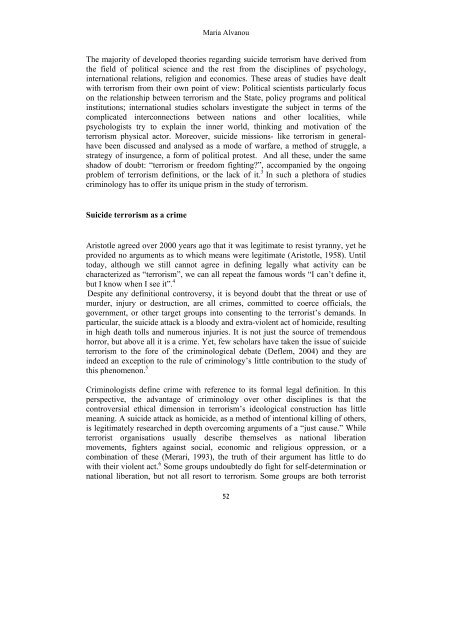222467to222472
222467to222472
222467to222472
Create successful ePaper yourself
Turn your PDF publications into a flip-book with our unique Google optimized e-Paper software.
Maria Alvanou<br />
The majority of developed theories regarding suicide terrorism have derived from<br />
the field of political science and the rest from the disciplines of psychology,<br />
international relations, religion and economics. These areas of studies have dealt<br />
with terrorism from their own point of view: Political scientists particularly focus<br />
on the relationship between terrorism and the State, policy programs and political<br />
institutions; international studies scholars investigate the subject in terms of the<br />
complicated interconnections between nations and other localities, while<br />
psychologists try to explain the inner world, thinking and motivation of the<br />
terrorism physical actor. Moreover, suicide missions- like terrorism in generalhave<br />
been discussed and analysed as a mode of warfare, a method of struggle, a<br />
strategy of insurgence, a form of political protest. And all these, under the same<br />
shadow of doubt: “terrorism or freedom fighting”, accompanied by the ongoing<br />
problem of terrorism definitions, or the lack of it. 3 In such a plethora of studies<br />
criminology has to offer its unique prism in the study of terrorism.<br />
Suicide terrorism as a crime<br />
Aristotle agreed over 2000 years ago that it was legitimate to resist tyranny, yet he<br />
provided no arguments as to which means were legitimate (Aristotle, 1958). Until<br />
today, although we still cannot agree in defining legally what activity can be<br />
characterized as “terrorism”, we can all repeat the famous words “I can’t define it,<br />
but I know when I see it”. 4<br />
Despite any definitional controversy, it is beyond doubt that the threat or use of<br />
murder, injury or destruction, are all crimes, committed to coerce officials, the<br />
government, or other target groups into consenting to the terrorist’s demands. In<br />
particular, the suicide attack is a bloody and extra-violent act of homicide, resulting<br />
in high death tolls and numerous injuries. It is not just the source of tremendous<br />
horror, but above all it is a crime. Yet, few scholars have taken the issue of suicide<br />
terrorism to the fore of the criminological debate (Deflem, 2004) and they are<br />
indeed an exception to the rule of criminology’s little contribution to the study of<br />
this phenomenon. 5<br />
Criminologists define crime with reference to its formal legal definition. In this<br />
perspective, the advantage of criminology over other disciplines is that the<br />
controversial ethical dimension in terrorism’s ideological construction has little<br />
meaning. A suicide attack as homicide, as a method of intentional killing of others,<br />
is legitimately researched in depth overcoming arguments of a “just cause.” While<br />
terrorist organisations usually describe themselves as national liberation<br />
movements, fighters against social, economic and religious oppression, or a<br />
combination of these (Merari, 1993), the truth of their argument has little to do<br />
with their violent act. 6 Some groups undoubtedly do fight for self-determination or<br />
national liberation, but not all resort to terrorism. Some groups are both terrorist<br />
52


